My time in the Zimbabwean Slammer—or The Incident, as I’d now also come to refer to it—had a profound and unexpected effect on me. Arriving at the end of a spell of compounding setbacks, it would have been all too easy to chuck this experience into the ring with all the others and go back to moping about my own misfortune. I could’ve painted it as the most significant blow of the lot; conclusive proof of my spree of bad luck; a convenient reason to throw in the towel.
But The Incident wasn’t a setback. Not even close. It was a display of intense human kindness at a moment of great need. It was a triumph of unconditional solidarity over abusive power. And, at the end of it all, it was freedom that prevailed, not restriction. They say it’s only when you’re closest to death that you feel most alive. From my experience in Zimbabwe, I suggest a corollary: it’s only when you’re closest to imprisonment that you feel the most free.
Far from dampening my spirits, The Incident had acted as the sounding bell for the trip’s final lap. A signal to double down, ditch the complaints, and fuse the protesting head and stoic legs once more into a united, positive front. It sparked a sense that the last month of this trip presented an opportunity to be enjoyed, rather than a task to be endured. The end, which I’d been willing ever closer for some time now, was finally beginning to yield to my wishes. And I imagined it wouldn’t be long before I’d be urging it to retreat again into soft focus. It was time to make the most of this journey, while there was still a journey to make the most of.
At James’ house, the following morning, we indulged in extended farewells. It was a ritual peppered with plenty of inadvertent references to The Incident—a subject whose compulsive introduction by my host was invariably followed by his hearty encouragement to forget all about it. It seemed to me that the whole circus of the night was something he might have loved to discuss more, had he not been someone so well versed in the art of gracious hospitality, where airing the misfortune of an honoured guest is considered a cardinal faux pas. With the final round of God-Bless-Yous ringing in my ears, I mounted Madonna and set a course to reunite with Thijs at the ruins of Great Zimbabwe: one of the continent’s last relics of ancient civilisation; the modern country’s namesake; and, allegedly, one of Zimbabwe’s must-sees.
When it comes to the subject of must-sees, I can be more than a little contrarian. The well-trodden paths are often the ones I find least enticing. And the paths leading to the world’s must-sees tend to be very high-traffic indeed. I never, for instance, felt a particular attraction to the safaris of Kenya, or a great desire to chart a diversion to Victoria Falls; and for the very same reason, I took a decidedly non-ferrous stance in relation to the magnetic appeal of Great Zimbabwe. But the prospect of continued company was a force to which I was far more susceptible, and Thijs was a shameless enthusiast in the face of must-sees, so my resolve was quick to crumble.
Unfortunately, this concession also meant swallowing the premium demanded by the orbital opportunists who were lucky enough to set up shop on the fringes of a world wonder. Coughing up the $20 for my night’s pitch, I did my best to ignore the fact that, in terms of square footage, my campsite bill was more than twice that of a penthouse suite at the Bellagio. The plan had been to stay two nights, with a visit to the ruins sandwiched between. However, upon discovering that the whack I’d shelled out for my canvas suite didn’t even include access to the ground outside its front door, I gave up on this plan and decided to ride on the following day. Not very in-keeping with my newfound joie de vivre, granted. But some things are sacred, and the bike tourer’s frugality is one of them.
The next day’s ride promised to be something of an epic: a 230 kilometre push, taking me to my final Zimbabwean refuge before the next Great Unknown: South Africa. That night, in anticipation of the approaching effort—for me, a long ride, for Thijs, some no-nonsense sightseeing—we both indulged in the restaurant’s buffet dinner. $25 was about the most I’d spent on a meal in a year—if you exclude the five-course tasting menu of Layounne’s McDonald’s—but $25 goes a hell of a long way when you possess the trained appetite of a touring cyclist. Ten courses later—and feeling a little like Violet Beauregarde in late-stage metamorphosis—I rolled out of the restaurant and into the bar. There, Thijs and I shared a final drink or two, regaling exuberant tales of our journey together long into the evening. At some point during this merry affair, I landed on 5am as my departure time. As it turns out, the cocktail of a close friend and a cold beer leave you feeling quite invincible.
Having spent most of the night tracking a pendulous course between my tent and the ablution block, by the early hours, the 5am start—though glamorous when first glimpsed through the fuzzy lens of last night’s merriment—had well and truly lost its sheen. Besides, long distance cycling ultimately boils down to a simple input-output ratio; and, after last night’s outputs, the buffet carb-load had proven to be a real zero-sum game.
So, instead, I postponed departure and rejoined my Dutch friend on his no-nonsense tour of Zimbabwe’s must-see. (Well, more accurately, I sat alone in the restaurant in silent protest of the $15 entry fee until FOMO, and a frank call from my Mum—who’d been researching the ruins and sounded dreadfully enthusiastic—convinced me to foot the bill and catch up.) And I must say, Great Zimbabwe delivered.
The day began with a tour, where we took great pleasure in requesting ever-more specificity—faces a picture of innocence—from our conservative local tour guide as they wrestled with their explanation of 12th-Century marital aids. Then on to the museum we went—a modest affair whose collection consisted mostly of imitations of what might once have been found there, had the British not stolen it all. Less susceptible to the sticky-fingered follies of the country’s colonisers were the king’s and queens’ quarters—vast edifices of intricate dry-stone-walling—that sat atop sheer granite cliffs. Soaking in the view from a seat worn to a comfortable concave by centuries of royal behinds, it was easy for me to feel rather regal. That was until nature abruptly called and I had to abandon one throne for another, braving the treacherous scramble back down to the visitor centre at breakneck speed.
That night, I gave the buffet a wide berth. After a far more modest dinner—which, following a discreet conversation with the manager to explain the night’s events, was on the house—I suggested another round of farewell beers to Thijs; a final, final hurrah. After yet more merriment, and no-doubt thanks to the potent cocktail that had spurred me on the night before, Thijs announced that the next day we’d be riding together. I wasn’t shot of The Analyst just yet! And a good thing too; 230 kilometres passes far more quickly in company.
As it happens, when that company is Thijs, this is true in reality, not just perception. We knocked off the day’s distance in a flash; an eight-hour time trial, of which I shouldered less than my fair share. For the rest, I hung out in familiar territory—the patch of protected land behind Thijs’ back wheel—and cowered from the elements. Clearly the dose of honest-to-God tourism had done the Dutchman well, who whooped and cheered as the kilometres disappeared beneath our wheels, dancing in his saddle to the beat pumping through his headphones. Even Zimbabwe’s Gonyethi (pronounced Gone-yet-i)—the two-trailer trucks named by virtue of the question they prompt as they make their prolonged overtakes on the country’s narrow roads—recieved a jubilant greeting from my companion. The drivers honked their horns and beamed down from their cabs as they passed. We shared delightful connections with the staff of our petrol-station pauses. The road, and the country, opened its arms.
We arrived at our night’s stopover wearing the day’s effort in a ruddy glow. As I began to explore our prospective digs, I got the distinct impression its typical clientele might sport a similar hue. The Lion & Elephant motel was a relic. The rooms were high-ceiling’d and broad-hearth’d. A profusion of smoking lounges branched off from a proportional excess of bars, the walls of which hung heavy with the stuffed remains of various once-majestic beasts—the sorts of animals that might have emerged victorious, had it been a fair fight. Conclaves of carved furniture—mahogany, for the sake of the story—wrapped in plush brocade, huddled discreetly beneath them, the taxidermic busts presiding over the furtive discussions. My wallet sighed.
The guests that arrived the following morning were an appropriate bunch. Adorned in broad-rimmed hats, pristine workboots and gilets, and each sporting the trademark blush, they arrived in a convoy of tricked-out pick-up trucks—or bakkies, as they’re known in these parts—clearly returning from a backcountry expedition; though, by the looks of things, the trucks had encountered more of the backcountry than their passengers. The group filed into the restaurant and washed down substantial breakfasts with an equally substantial volume of beer, before piling back into their bakkies and disappearing in a cloud of dust. Perhaps the designated drivers had hidden themselves away in another corner of the hotel and seamlessly reintegrated with the group as they’d departed. Perhaps.
As if to quell any doubts, the universe swiftly deployed a clarifying party in the form of another bakkie. The driver and his girlfriend hopped out and shouted a cursory greeting my way before getting straight down to business. Bar open? he asked. I hesitated, fighting the urge to glance down at a watchless wrist. Had a watch been in situ, it might’ve read far too early for a drink. Which one? I called back. The notion of multiple bars seemed to animate my new acquaintance no end, who darted inside with expectant glee. Moments later, he reemerged, clutching a full-gauge bottle of vodka and a six-pack of Cokes. For the road, he winked, flashing me with a brazen smirk. This journey’s shit-dull if you’re sober. I watched as they spun their tyres on the gravel and hurtled back down the driveway, continuing their charge towards the South African border. Not for me, I thought, I’d bargain that it’s far more interesting in the land of the living.
Our 90 kilometre ride to the border was a subdued affair. The same road that had, a day earlier, stirred Thijs to dance in his saddle and offer greetings with the social incontinence of an American on the Tube, had suddenly transformed. No longer a yellow brick road of kindly companions, it now had teeth and the stench of booze on its breath. Clouds had drawn in. Grey skies, grey tarmac, grey cars. Glass lined the hardshoulder, enough for Thijs to pick up his first puncture of the week, and for me to pick up my fiftieth. My post-imprisonment pep put up a good fight, but the truth was, I was scared. When we arrived, the border was eerily quiet. There was none of the reassuring chaos of the Africa I’d come to know. South Africa lay beyond: a land of anxious warnings. Never let your bike out of sight. Never stop in town. Never ride at night. Or in the afternoon, for that matter. Trust no-one. We funnelled through the empty zigzag of barriers, wondering if there ever was a crowd to be controlled, before emerging onto a lifeless stretch of tarmac—all high-sides, gantries and security cameras. No time for feet-finding here. We both felt a quiet urge to keep moving.
It was Thijs who pointed out the sign. Crime Alert. Do Not Stop. For reassurance, we stopped—a real Catch 22, now I think of it—at one of the police cars dotted periodically in alcoves beside the road. The officer inside was not reassuring. The road’s safe enough, he admitted, but don’t stray too far from it. In the bush they’ll tear you apart. Of course, he neglected to mention who they were, allowing my own inherent prejudices to conduct the profiling, unchecked.
The warnings I’d received about South Africa often had racial nuance—some more pronounced than others. It’s easy to see how ideas like this spread. It felt shameful and vulgar to sense these prejudices seep through my layers of moral fibre and plant a small seed of doubt—tiny, but unmistakably there. In a completely unfamiliar place, you can only go on the information you’re given. But when that information is the result of generations of ethnocentrism, segregation and racism, blind faith can be a dangerous tack.
Thijs and I parted ways for the final time at a retail park in Musina—a suitably dreary setting, given the circumstances. It was early afternoon and I planned to push on, while Thijs had decided to stay put for the night and assimilate. As soon as the Dutchman slipped from view, I switched gears and upped the pace—eyes scanning skittishly, head on a swivel—until I’d returned to the safety of the highway. It’s funny, in my efforts to escape the imagined threat of the town’s smaller fish, I’d inadvertently swum straight into the jaws of something far deadlier. So began my affair with the continent’s worst road.
The N1 sews a seam through South Africa, from the Zimbabwean border right down to Cape Town. It wasn’t my first run-in with a Big road, nor a busy one, but, so far, both have either been too empty—like the coastal road sweeping through the Sahara—or too potholed—like Malawi’s lakeside route—to pose any real threat. Even when the roads have improved, or the traffic thickened, the vehicles themselves have been so old that airborne debris, dislodged as they gradually lose integrity, has posed a more credible threat than speed. But in a land of smooth tarmac and smoother bodywork, the 120km/h speed limit suddenly becomes a meaningful upper bound. And, in South Africa, I sensed it was one to which few too strictly adhered.
The problem with the N1 was not just the speed, it was my proximity to it. The road has no hard-shoulder. Two opposing lanes of traffic collide in a space scarcely sufficient for one. Add a single cyclist and the whole thing goes to shit. Trucks thundered past, less than a foot from my shoulder, the drivers hurling abuse into the vacuum of their wake. 90 kilometres passed in the present tense. My hands fused to the bars, white-knuckled, while grime and tears streaked my cheeks—a mask of complete exhaustion, stricken fear, and sorrow at the cheapness of life. The words of the South African from the Lion & Elephant played on a loop—a nonchalant fuck you to my very existence—as did the tragedy of a touring cyclist, killed the week before by a reckless driver in Nigeria. The news had travelled round our small community of African tourers, many of whom had met him on the road. I felt close, so close, to being reduced to an article on the local news; a message forwarded around bands of acquaintances; and a gaping hole in the lives of a small few.
But no cigar.
Zvakanaka Farm sat at the top of a 15 kilometre climb. A 15 kilometre climb takes a very long time when your mind’s securely anchored to the present. The blind corners, my creeping pace, and the unlit tunnels, which punctured the landscape’s otherwise impregnable peaks and ridges, compounded the effect. But even a long time eventually comes to an end. The turn came just before the summit, and I took it, hauling myself from the sea of traffic like a shipwrecked sailor collapsing on a spit of dry land. I helped myself to greedy lungfuls of air, savouring sweet relief. It appeared I’d been holding my breath for the last four hours.
The farm’s gate slid open and I was greeted by Gracious, the groundsman. Moments later, I was sat amongst his family, huddled round a steaming pot of Roiibos tea suspended over glowing embers. We admired his son’s trainers—box-fresh again after a fastidious clean; we talked about Zimbabwe and Gracious’ life before South Africa; and we drank our piping brews, whose warmth cut through the chill of dusk. These moments obscured the rest; these connections were worth every second. The raw humanity of people embracing me as they would their own blood. That’s how it had been with James. And it was a theme that was about to characterise my last month on the road.





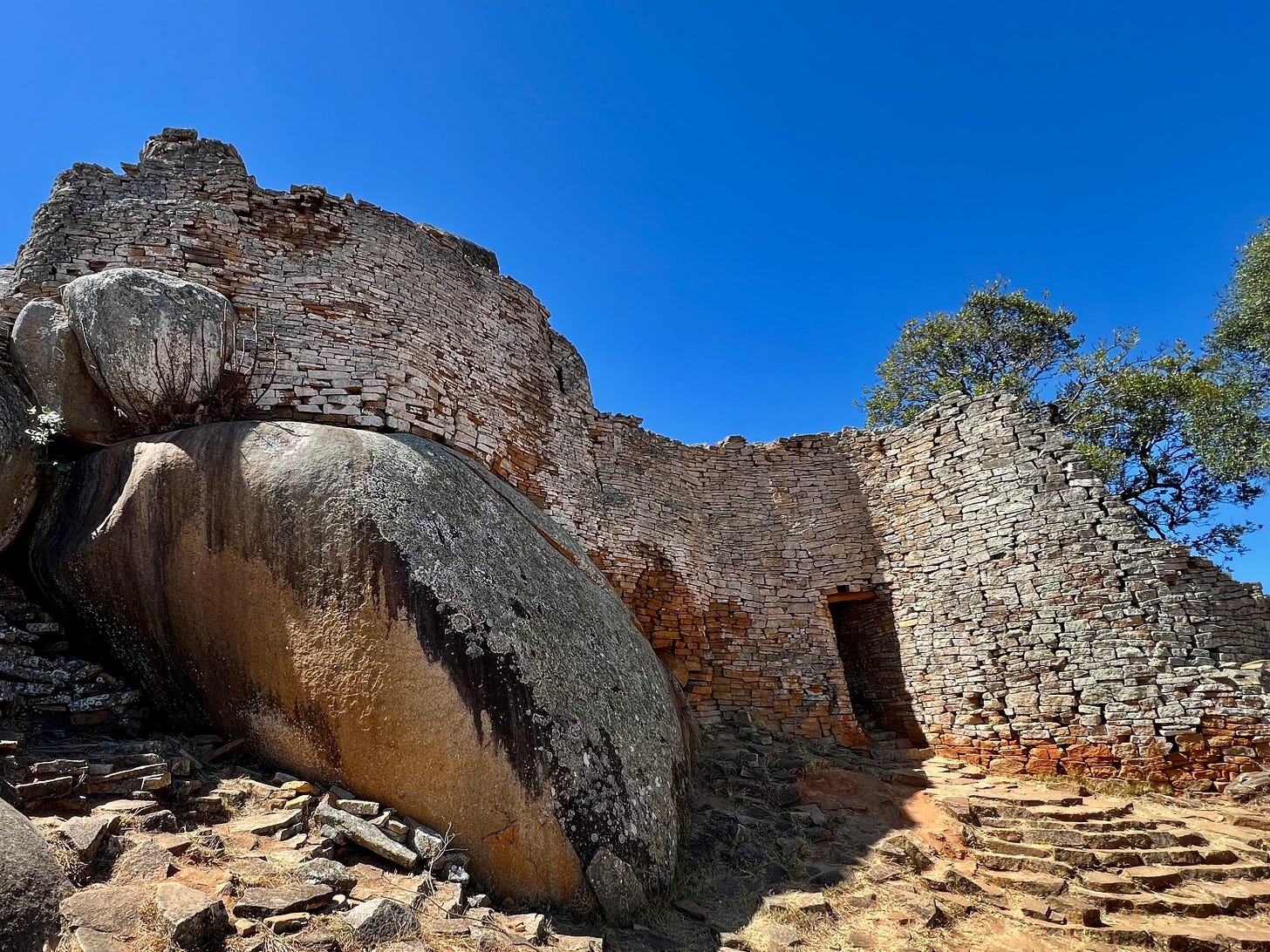
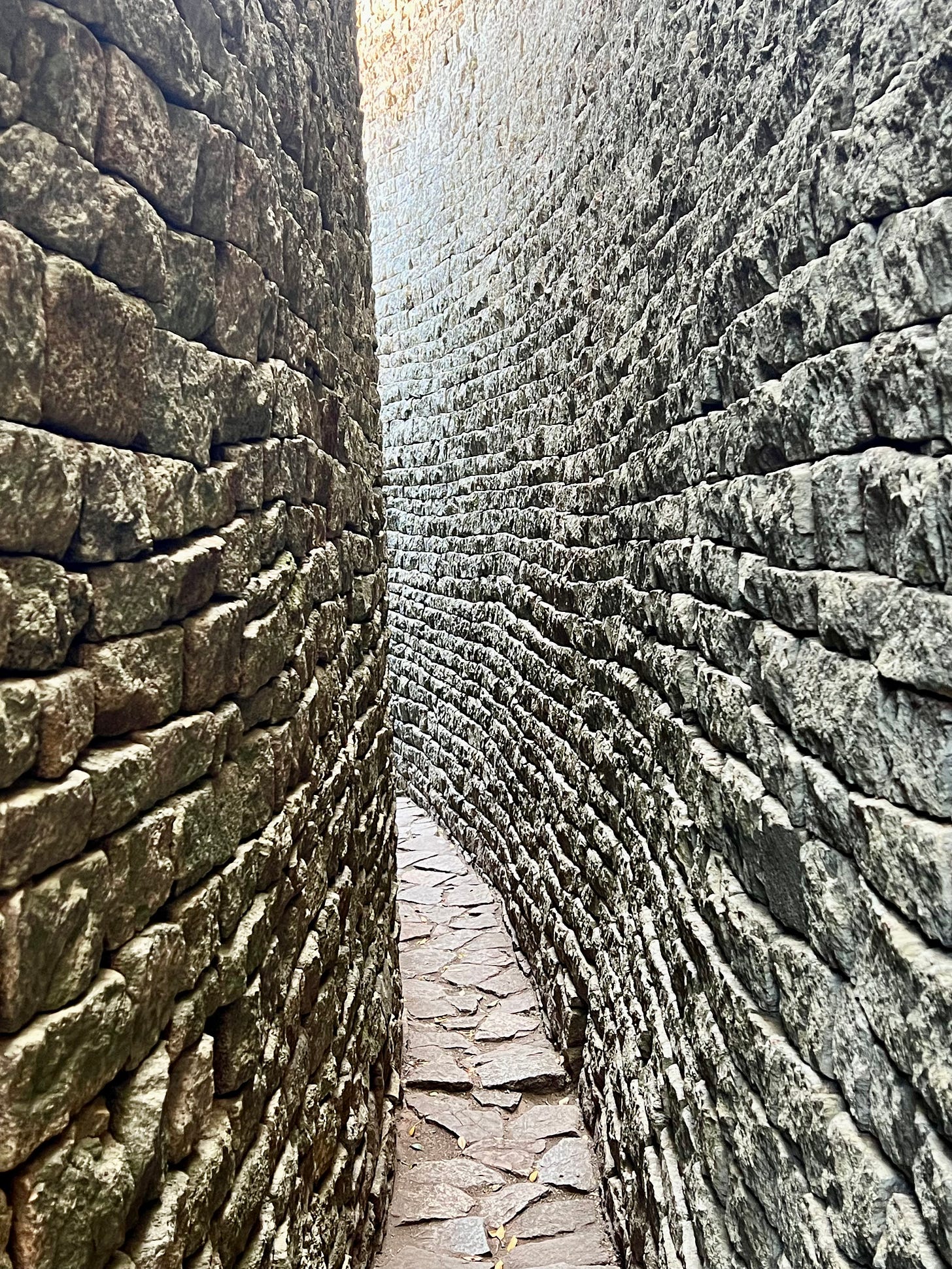
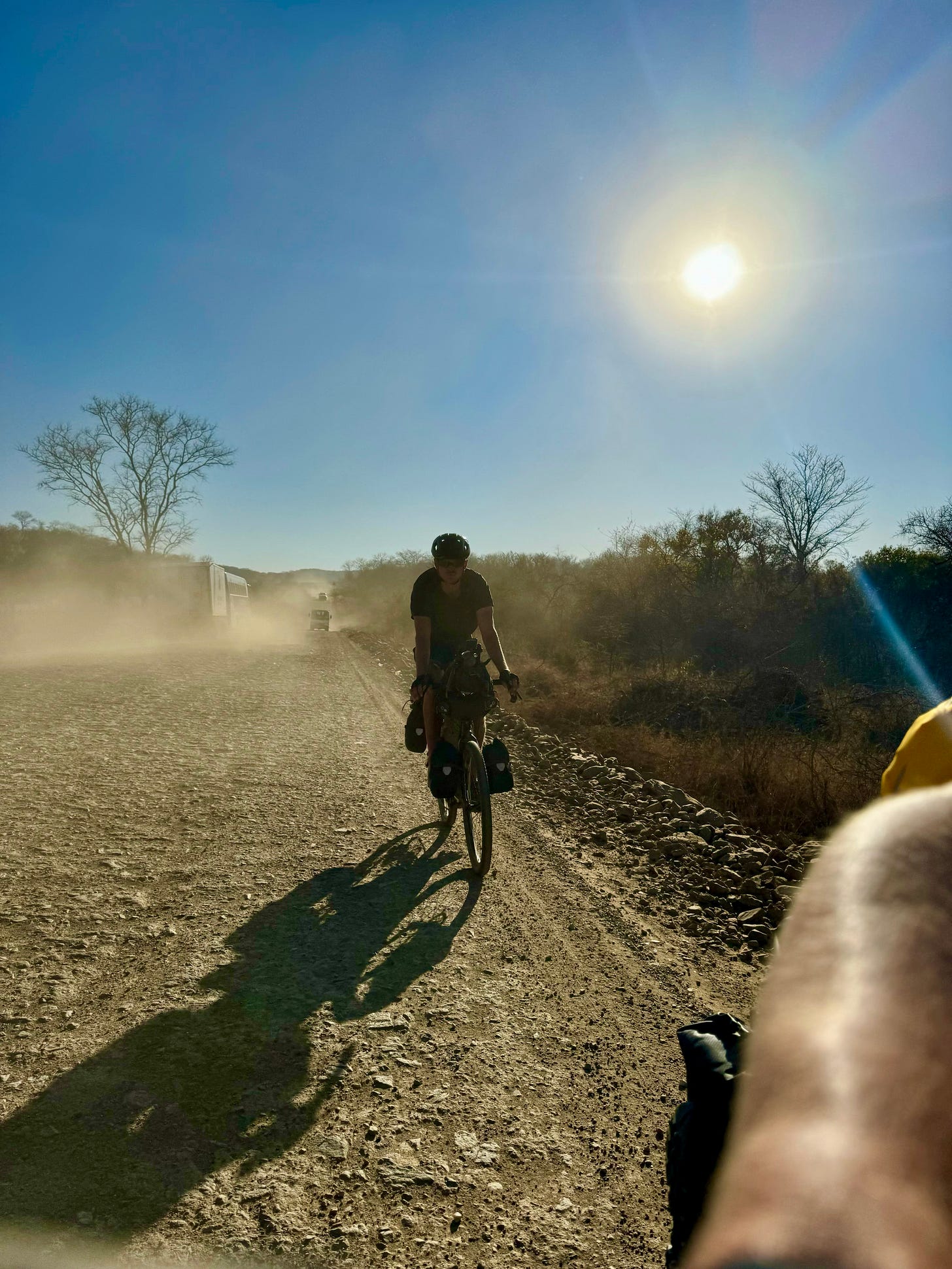



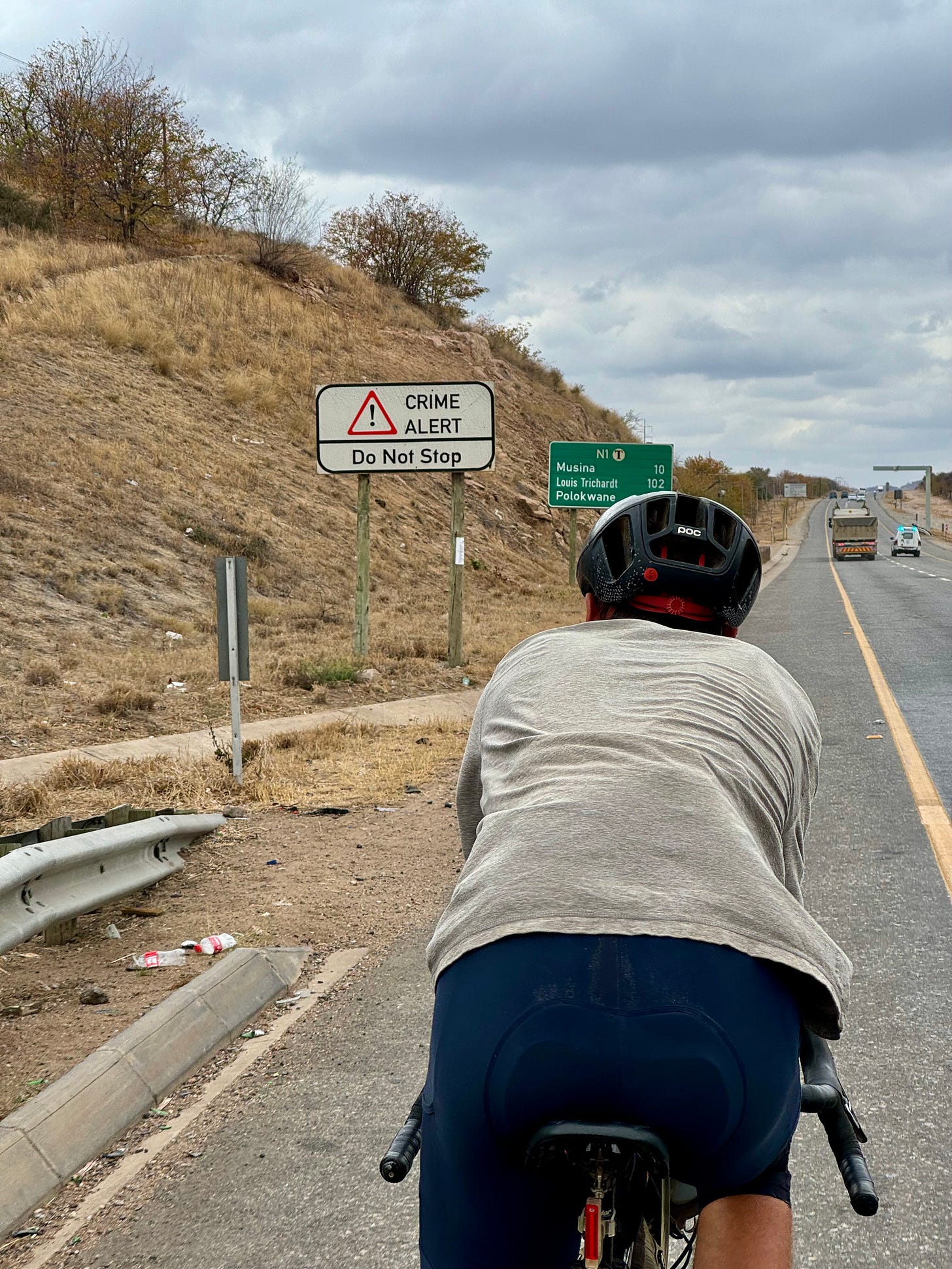
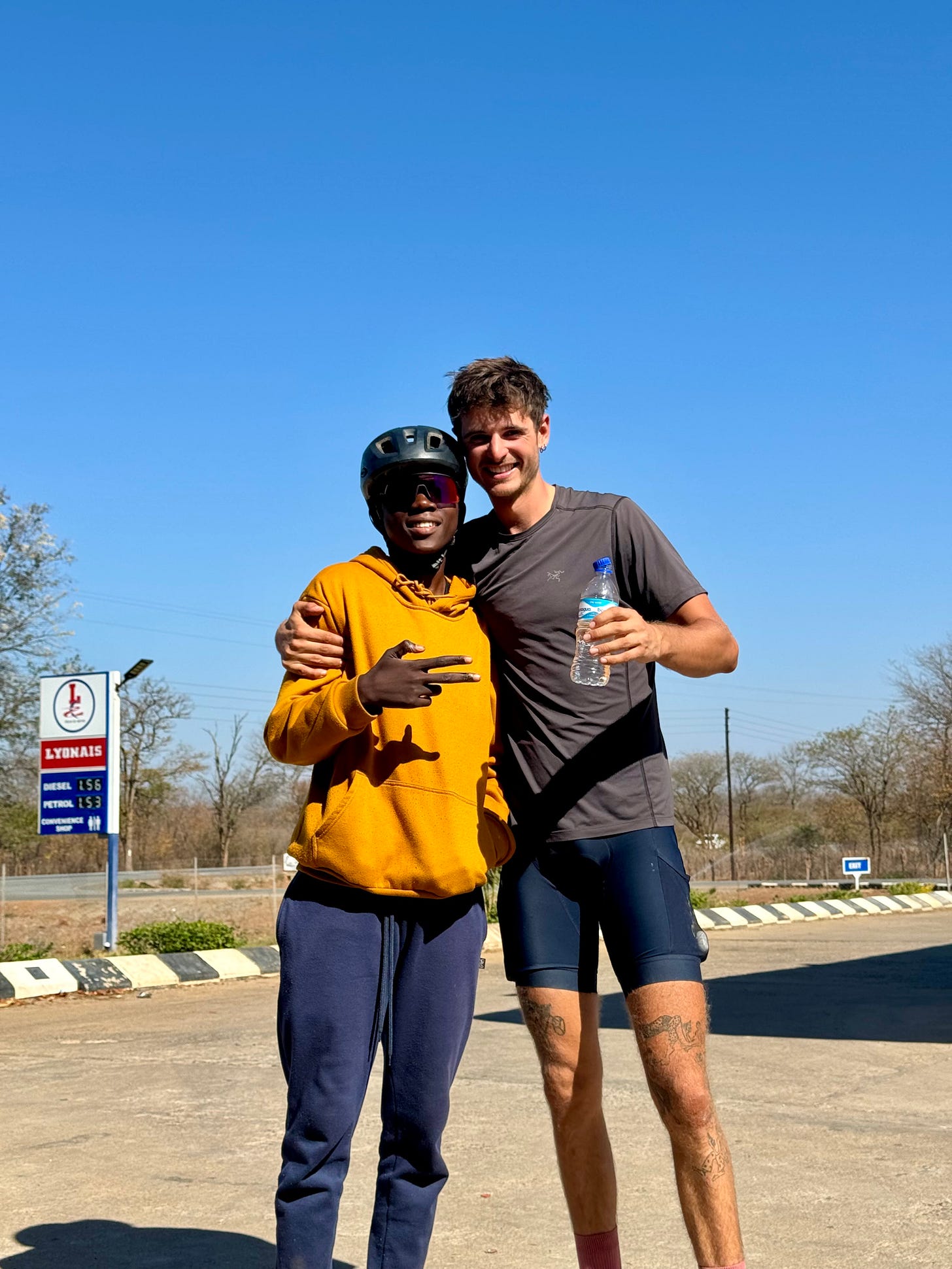
Mildly terrifying, Jake, even knowing you’re safely home… Praise the Lord! 😉🙏
Another masterpiece of a blog Rosie - written with all the emotion of the events even though now being written from 1st world desks
With the prospect of the 'end' of an epic undertaking comimg into sharper focus - I am very pleased to hear that it made your hunger and investedness turn up a notch or 5
Hope you are enjoying writing these blogs, as much as I am enjoying reading them...... keep on, keeping on Rosie xxxx